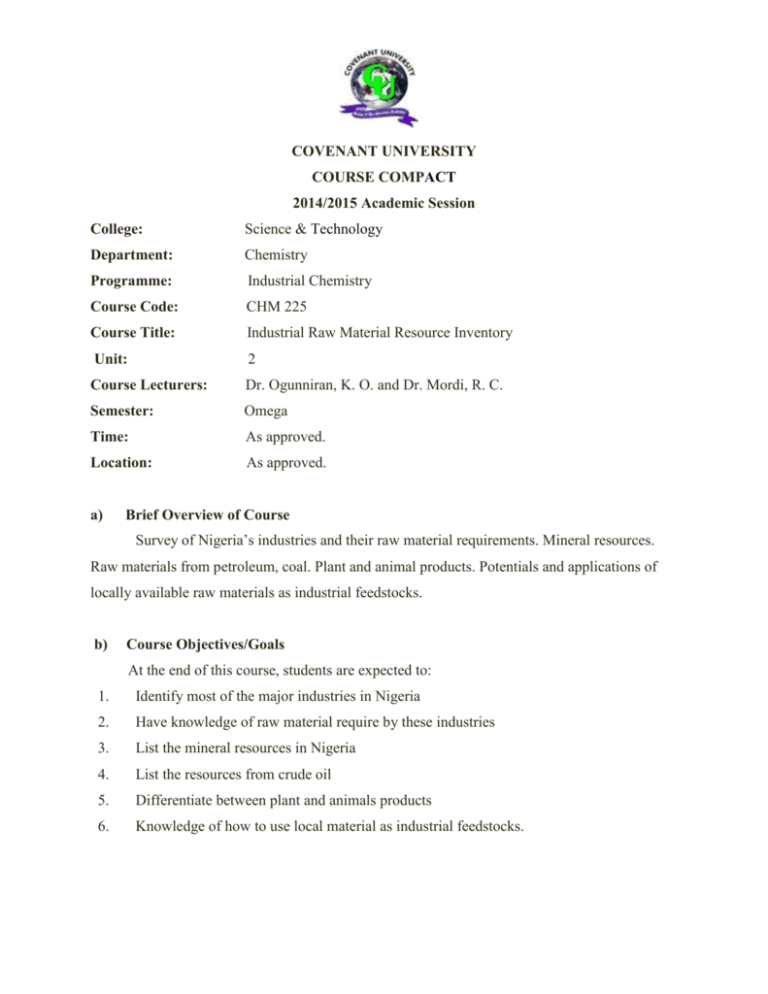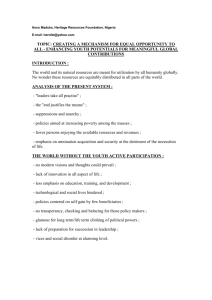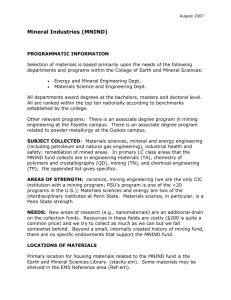COVENANT UNIVERSITY COURSE COMPACT 2014/2015
advertisement

COVENANT UNIVERSITY COURSE COMPACT 2014/2015 Academic Session College: Science & Technology Department: Chemistry Programme: Industrial Chemistry Course Code: CHM 225 Course Title: Industrial Raw Material Resource Inventory Unit: 2 Course Lecturers: Dr. Ogunniran, K. O. and Dr. Mordi, R. C. Semester: Omega Time: As approved. Location: As approved. a) Brief Overview of Course Survey of Nigeria’s industries and their raw material requirements. Mineral resources. Raw materials from petroleum, coal. Plant and animal products. Potentials and applications of locally available raw materials as industrial feedstocks. b) Course Objectives/Goals At the end of this course, students are expected to: 1. Identify most of the major industries in Nigeria 2. Have knowledge of raw material require by these industries 3. List the mineral resources in Nigeria 4. List the resources from crude oil 5. Differentiate between plant and animals products 6. Knowledge of how to use local material as industrial feedstocks. c) Methods of Lecture Delivery/Teaching Aids 1. Teaching. 2. Class interaction and discussion. 3. Guided instruction and demonstration. 4. Usage of overhead projector and multi-media. 5. Lecture notes. d) Course Outlines Survey of Nigeria’s industries and their raw material requirements. Mineral resources. Raw materials from petroleum, coal. Plant and animal products. Potentials and applications of locally available raw materials as industrial feedstocks. Dr. Ogunniran, K. O Module 1: Module 2: Survey of Nigeria’s industries and their raw material requirements. Week 1: Factors Affecting Location of Industries Week 2: Glass industries Week 3: Cement and some building material industries Week 4: Ceramic industries and surface coating industries Week 5: The perfume industries and soap and detergent industries Mineral resources. Raw materials from petroleum, coal. Week 6: Manufacture or petroleum refining Week 7: Manufacture of petrochemicals Mid-Semester Examination Dr. Mordi, R. C. Week 8: Module 3: Products derived from coal Potentials and applications of locally available raw materials as industrial feedstocks Week 9: Chocolate and cocoa Week 10: Adhesives Week 11: Explosives Week 12: e) Tutorials: Solar energy Revision and evaluation of students’ understanding of the course will be performed in Week 13. f) Structure of the Programme/Method of Grading Continuous assessment - 30 marks Test 1: - 10 marks Mid-Semester Test: - 20 marks Examination g) Theoretical questions from course Lecturers 70 marks - 70 marks Ground Rules & Regulations Attendance shall be taken during lectures. Mandatory 75% class attendance. No students shall be allowed into the class 10 mins after scheduled time. Students shall be asked questions randomly during lectures. h) Topics for Assignments Do a comprehensive survey of solid phase extraction (SPE) techniques. Give a scheme of reaction for the production of para acetaminophen i) Alignment with Covenant University Vision/Goals The new generation of leaders are expected to explore new analytical techniques. The lectures will enhance the capacity of the students to connect theory with real life application. j) Contemporary Issues/Industry Relevance The theoretical knowledge of organic synthesis and analytical chemistry to facilitate process development and method optimization in designing and utilization of raw materials and equipment for efficient production. k) Recommended Reading/Texts John E. McMurry. Organic Chemistry. Third Edition. Peter R. S. Murray. Principles of Organic Chemistry. Vogel’s Textbook of Quantitative Chemical Analysis (2000). Sixth Edition. Udoh, A. P (2008). Basic Indusrial Chemistry, Yakndara Publishers.







